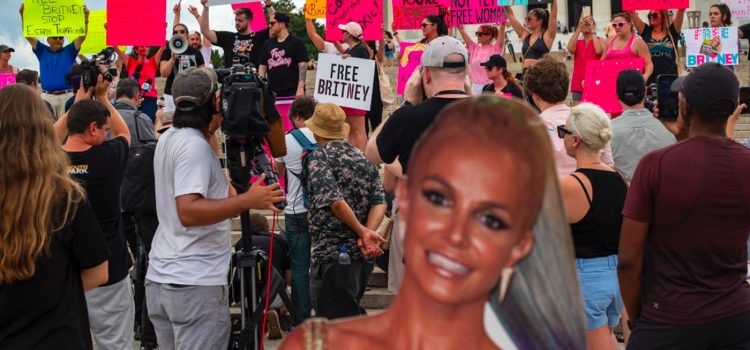
What was the “Free Britney” movement? How did the movement help the musician escape her conservatorship?
The “Free Britney” movement (better known as #FreeBritney) was launched by fans who expressed concern about the pop star Britney Spears being held under a conservatorship in her 30s. In her memoir, The Woman in Me, Spears opens up about the movement after learning about it in rehab.
Learn more about the Free Britney movement and how it helped expose the terrors of the conservatorship.
The Fight of Her Life
Long before the Free Britney movement became popular in 2019, Spears knew that to win back control of her life, she would need more courage than anything she’d done. Her years chafing under the conservatorship had strengthened her in ways she hadn’t been before, but challenging her father’s authority would result in a retaliation that would almost prove unbearable. Spears talks about how she began to assert herself, how her father responded by sending her to rehab on trumped-up allegations of mental instability, and how she finally found the legal help she needed to end her father’s abuse of his power.
In 2016, Spears recorded a new album, Glory. Through the process, she rediscovered her love for making music, as well as her joy in performing. Spears felt her self-confidence growing, which she hid from her father at first. While filming the video for the song “Slumber Party,” Spears met her future husband, Hesam Asghari, but when they discussed starting a family together, Spears’s father refused to let her stop birth control. Asserting herself, Spears pushed for new songs to be added to her concerts, but her father refused every request. Tired of her father’s excessive restrictions, Spears writes that she actively started to rebel.
(Shortform note: Hesam “Sam” Asghari is an Iranian-American actor who immigrated to the US in 2006. He’s appeared in several films and TV series, including Black Monday, PBC, and Special Ops: Lioness. Spears and Asghari married in June 2022, but Asghari filed for divorce in August 2023, between this book’s writing and its publication. Spears refused to comment on their breakup beyond stating that her private life isn’t the media’s concern.)
In October 2018, Spears publicly rebuked her father and her managers by refusing to speak at an event to announce an extension to her Vegas residency. However, she says the spark that ignited her father’s fiercest retaliation against her was during a later practice session, when she simply said “no” to a difficult dance move one of her choreographers suggested. Spears’s father and management team’s response to her asserting herself was extreme. They accused her again of “energy supplement abuse,” had a psychologist declare her mentally unfit, and in January 2019 they sent her to a rehab facility where she’d be locked away for months.
(Shortform note: During the early months of 2019, the press painted a starkly different picture than what Spears now reveals to have happened. TMZ reported at the time that Spears checked into rehab voluntarily and that she was concerned about her father’s health. In Touch Weekly claimed that when she was released, she was welcomed by her loving family and that her mental health was much improved. These articles relied on unnamed “inside sources” and listed much shorter times spent in rehab than what Spears documents in her memoir.)
Trauma in Rehab
Though Spears had been in rehab clinics before, this experience was worse than any she’d gone through. All of Spears’s privacy and autonomy was stripped away. She writes that she was under constant observation, even when bathing or changing her clothes. Doctors physically examined her daily, repeatedly drawing her blood and forcing her to take lithium, which slowed her mind and skewed her sense of time. During her first two months in the clinic, she had no contact with anyone who wasn’t in power over her. Though she begged to be released, Spears’s father could have stopped her treatment and simply chose not to. He wanted to punish her instead.
When reflecting on how she survived her ordeal, Spears insists that she was only able to pull through because God gave her the strength. A sympathetic nurse made Spears aware of the #FreeBritney movement that began when fans suspected she was being kept somewhere against her wishes. Knowing about her fans’ concern buoyed Spears until her release in April 2019. Her family behaved like everything was back to normal, but months later, Spears learned that her father had physically assaulted one of her children. Despite her exhaustion, Spears knew she had to take control of her life back, for her own sake and for her sons.
(Shortform note: Though Spears first mentions the #FreeBritney movement in regards to the events of 2019, it actually began in 2009 through the efforts of Megan Radford and other Spears fans who were troubled by the conservatorship since shortly after its inception. However, the movement only started gaining traction in 2019 when an anonymous source who claimed to have worked as a part of the conservatorship’s legal team spoke on the Britney’s Gram podcast. This source told Spears’s fans that she’d been forced into treatment unwillingly, stoking fears among her followers that Spears was being abused.)
| Abuses in Mental Health Care The experiences that Spears describes above align with those of others who’ve spent time in similar clinics. Mental health patients are often denied rights that are afforded to convicted felons, such as the right to representation or to have a say in their treatment. An undercover reporter for the BBC witnessed patients being forced to live in seclusion while under constant, intrusive observation. That Spears was made to take lithium against her will goes against ethical medical standards—although lithium can treat certain mental conditions, it comes with risks and should not be prescribed without a patient’s informed consent. Human rights violations in mental health facilities are common enough that the World Health Organization recommends an end to treatment based on medication and coercion in favor of community-centered practices that respect each individual’s autonomy. Likewise, Mental Health America has issued a statement on mental health rights, asserting that people with mental health problems have the right to make decisions about their treatment, the right to live free from isolation or restraint, and the same right to privacy as anyone else. |
Breaking Free
Spears reached out to her fans through social media—first, to show she was alive, and then to let people see her as a person and not an entertainment property. The Covid pandemic gave her a respite during which she focused on self-improvement work and strengthening her relationship with God. She insistently called her court-appointed attorney to work toward ending her conservatorship, but her lawyer provided little assistance. Left with no other recourse, on June 22, 2021, Spears called the police to report that she was being abused.
On the following day, Spears made a statement to the court that was broadcast online for all to hear. In it, she described the conditions she’d lived under and her prior efforts to end her conservatorship. Learning that she’d been lied to about her rights to a private attorney, Spears hired a new lawyer who devised a two-step plan—first, to petition for her father’s removal as conservator, and then to end the conservatorship altogether. In September 2021, the court stripped Spears’s father of control of her life. In November, the conservatorship ended completely, and Spears received the news that after 13 years, she was a free woman again.
(Shortform note: Though Spears only gives the highlights of her June 23 testimony in her book, her full statement lasted over 20 minutes. Beyond describing the events leading to her involuntary hospitalization, Spears stated that she was no longer willing to sit for any further closed-door interviews or evaluations, but preferred to speak to the court and the public directly about her situation. She also revealed that her court-appointed attorney advised her against speaking out about her treatment because the rehab facility she’d been in might sue her.)







This short message is for the above author. Thank you, katie. For bringing integrity, respect, facts and honor to Britney Spears name and story. If everyone wrote like you did, the world might actually be a better place. I firmly believe that. Thank you again.